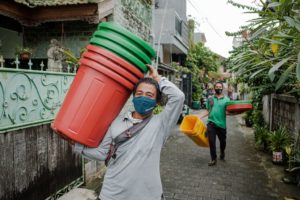Recycling in Indonesia is broken. Use of single-use plastic is surging and landfills are overflowing into surrounding communities, causing widespread environmental, economic and social damage. In Bali over 80% of waste is unsorted and items like glass, paper and plastic, which could be easily recycled, end up in landfills or leak into the oceans and the environment.
Rethinking Recycling believes that behavior change is critical to solving the waste crisis and fixing the broken recycling value chain. Households are the critical first step in the value chain where the fate of waste is decided, whether it will be recycled and put back into productive use or sent to landfill. By instilling waste sorting into the culture of a community and the habits of its residents, Rethinking Recycling believes that it can significantly reduce the amount of productive waste sent to landfill.
The Rethinking Recycling program not only focuses on improving source separation rates, but also the quality of the separation. Oftentimes, even if waste is sorted, it is done inaccurately leading to contamination and rendering the separated waste unrecyclable and therefore sent to landfill. Rethinking Recycling focuses its education on how to properly separate waste into the three waste categories (Recyclables, Organics, and Waste Residue) and provides secondary sorting at its partner Materials Recovery Facilities (MRFs) to ensure a high quality of sorted recyclables is achieved. By facilitating behavior change education, we are able to improve source separation quality at the very beginning of the value chain, therefore not only decreasing the amount of waste that is going to landfill, but also increasing efficiencies by reducing the amount of unnecessary tertiary sorting activities required along the remainder of the recycling value chain.
Rethinking Recycling’s initiatives

In March 2021, the Rethinking Recycling Academy launched its behavior change program in two communities in Bali, Kesiman Kertalangu and Tegal Kertha. Working off of our pilot program, Desa Kedas in Sanur Kauh, the Rethinking Recycling Academy has developed 3 initiatives fundamental to the success of our behavior change program. Through the introduction of scheduled collection, separation bins and a newly developed AI powered chatbot on Whatsapp that answers questions on source separation, the Rethinking Recycling Academy is beginning to transform the recycling habits of over 100,000 residents across Bali that will meaningfully transform the recycling value chain.
Prior to the transformation, all waste streams (Recyclables, Residue and Organics) were collected every day, resulting in residents having little to no reason to separate their waste at home. With the introduction of scheduled collection the different waste streams are only picked up on certain days of the week, creating not only an educational moment for the community but also a structural incentive for residents to separate their waste.
We have seen through our pilots that scheduled collection drives higher rates of participation in source separation. By creating a structural change, scheduled collection allows a consistent and stronger message to the community: their sorted wastes will not be mixed again after the collection process. – Violy Purnamasari, Rethinking Recycling’s Behavior Change team lead
Working in tandem with scheduled collection changes, the Rethinking Recycling Academy provides each household with colored separation bins for the different waste streams. The colored separation bins – green for organics, yellow for recyclables and red for waste residue – are intended to lower the financial and psychological barriers of recycling by providing residents with all the necessary equipment and in-home reminders to be a successful recycler.
In other pilot villages that we have studied, like Kedonganan, we have seen that the most successful villages are those that have provided separation bins for their community. Without the bins, it’s difficult to standardize sorting quality and motivate community members to separate. – Isabel Alison, a Rethinking Recycling Fellow

In addition to the on-the-ground interventions, Rethinking Recycling has also launched a chatbot to help answer residents’ questions on recycling and source separation. The chatbot, named Ami (short for “Let’s Separate!” in Bahasa), is able to answer questions on recycling infrastructure, collection schedule and which waste categories different items belong to.
Ami is the first step for the Rethinking Recycling Academy to digitize our behavior change program and initiatives. Building off of Ami, we hope to build out a scalable, digital solution that can help us track communities progress on their behavior change journey… – Barry Saunders, Rethinking Recycling’s Director of Digital innovation
With firm conviction in the value of behavior change, the Rethinking Recycling Academy is excited to continue expanding its educational reach. As we grow the number of communities in our program we plan to design more scalable and innovative digital solutions and produce shareable educational content. Together, with our communities and strategic partners, we will continue to create programs that inspire residents to believe that their personal contribution to recycling makes a difference and that our collective impact will contribute to solving the waste crisis.
